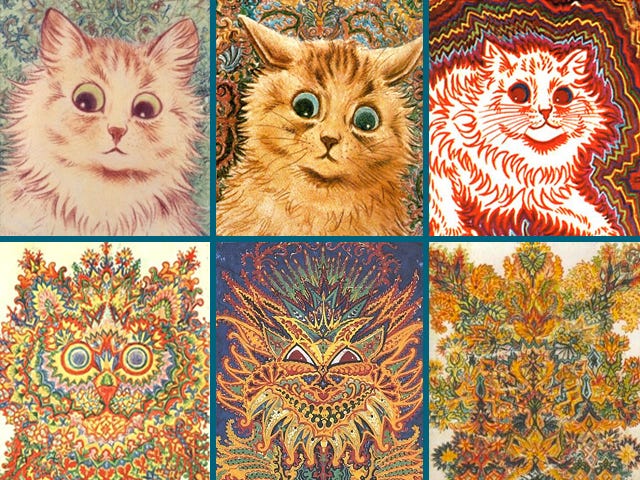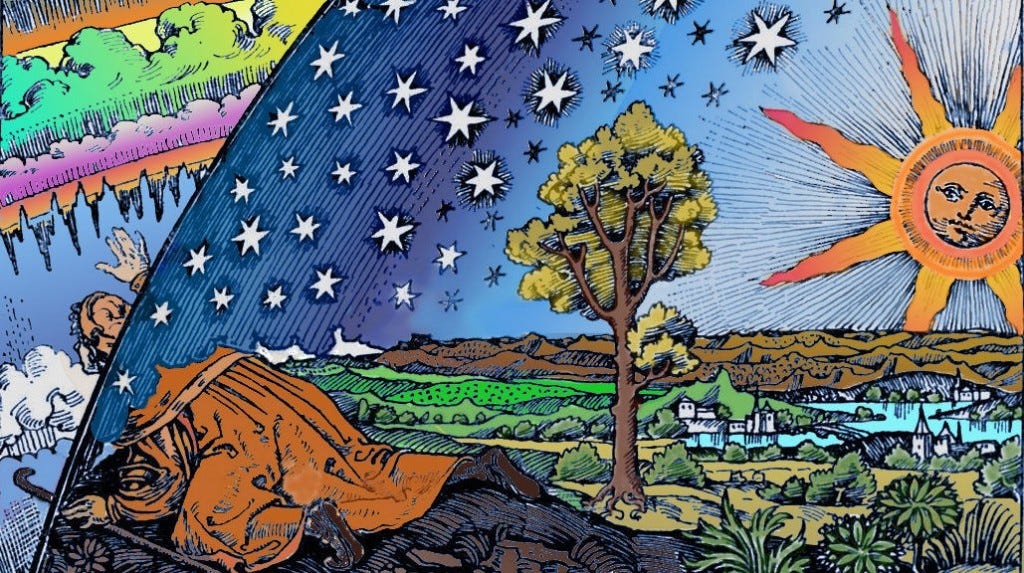When I was in college, a marvelous thing happened.
Our campus, which was in a major city, had a sort of terminal of tunnels which connected all the buildings to each other. The terminal featured a number of columns wrapped in corkboard for posting flyers, and the walls were lined with transparent plastic display cases which students could slip flyers into. So basically it was a big, colorful advertising space that student clubs used to announce upcoming events, scholarship opportunities, and that sort of thing.
But one day, on my way to a student club meeting, I entered the terminal to find that every bulletin board and display case had been covered with copies of a single flyer. The usual diversity of the terminal had been replaced with a stark monotone. Clearly, somebody had something very important to say.
This is what the flyer*, which overwhelmed every inch of visible space in the terminal, said:
My name is Anjum Malhotra
I am 19 years old
and I AM GOD!!!!!!!!!!!!!!!!
I paused to take stock of the situation. Whoever this boy was, he had gone through the trouble of making hundreds of copies of this document and painstakingly filling the terminal with it. He left no contact information or website where he could be reached. This was not an advertisement. So I did not get the sense that he was joking.
When I arrived at our club office, a few of my co-officers were already there. I dared to broach the subject: "Hey, did you guys see the flyers...?"
"Yeah," one officer, Anna, replied. She suddenly looked distressed. "You know, with mental health, sometimes these things happen. Some people get grandiose and they lose touch with reality. It's really sad."
Sad? It hadn't occurred to me that there was anything sad about the flyers. Weird, maybe. But not sad.
But now that Anna had brought the word "sad" into it, I started to think that maybe it was. Maybe this poor guy was going to come down from his manic phase and realize that he'd made an explosive embarrassment of himself. Maybe people were already making fun of him for it. Maybe he'd never want to show his face again.
Second to hit me was her use of the phrase "mental illness." Anna was essentially calling this boy sick.
I internalized that incident, filing it away under "things to avoid." I thanked my lucky stars that I had never embarrassed myself by losing control like this boy had. Unlike him, I managed to keep my inner sense of godhood a secret. I tied up my mystic in a straitjacket and medicated her until she was dazed and confused.
But the incident continued to haunt me, because my inner mystic, feeling wronged and violated by my attempts to bind and restrict her, began to act out. She wrestled inside of me, more wrathful by the day, threatening to rip me open from the inside out just so she could taste freedom. Though I may have seemed relatively "sane" to an outside observer, my inner world was becoming increasingly disorganized and disturbing. I endured long periods of passively-suicidal depression, addictive behavior, and unnerving intrusive thoughts. Every day I became more desperate not to lose my grip on reality, and this desperation triggered very impulsive decisions - like moving across the country to a place I'd never been to before, which I did twice. My biggest fear was 'going insane.' But ironically, the more I tried to appear sane, the more insane I acted.
The more I dug deep into this horror, the clearer it became: I wasn't losing touch with reality so much as I was losing touch with myself.
More horrifying than the possibility that I might be institution-worthy, was the possibility that I was lying. To myself. To everyone. I was pretending not to sense the subtle undercurrents of reality. I was pretending that I didn't have profoundly deep psychic sensitivity. I wasn't afraid of insanity. I was afraid of appearing to be insane. I was afraid of being called insane.
My entire life became an ongoing justification for my perception of the world. But instead of being rewarded with validation or reassurance that my perception of the world was "correct," my never-ending "sanity performance" only brought more questions, more stress and more isolation.
It was only when I hit a breaking point, that I had the breakthrough necessary to fully embrace my perceptual orientation as a mystic and arrive at a state of profound inner peace. And now I could ask myself:
Why had I become afraid of my mysticism in the first place?
Where had this fear come from?
Upon deep reflection, I have come to conclude that pejorative-schizophrenia is a byproduct of the intrinsic inadequacy of language-based communication.
Let's break down what I mean by that:
At the moment in our culture, "schizophrenia" is primarily used as a pejorative (an insult/disparaging label). Like most disorders in the DSM, there is a huge gap between what constitutes a professionally-diagnosable disorder, and what the general public understands about that disorder. In other words, there's the actual illness, and then there's the stigma around it — and unfortunately, most people mistake the stigma for the disorder itself.
So more often than not, when you hear someone casually being called "schizophrenic," it won't be because they exhibit catatonia, social withdrawal, or poor hygiene, which are necessary criteria for an official diagnosis. It will be because they say things of a spiritual nature that the listener doesn't understand or agree with. Thus, the word "schizophrenic" is now commonly used to dismiss people who speculate and draw unusual conclusions about themselves and the world — even if they are an otherwise healthy and stable individual.
So when I say pejorative-schizophrenia, I am referring to the phenomenon of conflating the term schizophrenia with spiritual speculation/psychic sensitivity.**
Having been insulted this way, the spiritual speculator is now caught in a bind. Not only do they have insights they'd like to share that are difficult to articulate by virtue of being accessible only by psychic insight or altered state of consciousness... but they must also make their point while attempting to prove that they have not lost touch with reality.
For this reason, many a super-sensitive (psychic) person will go out of their way to find common ground with their materially-oriented (hylic) audience. The psychic learns to speak like a hylic, in terms of strict materialism, rationalism, and scientism. They gather up scientific evidence to make their case. They appeal to experts and authority figures, they cite their sources, the whole shebang. They take painstaking care to convey enormous concepts in ways that a newcomer to such ideas will be receptive to.
But ironically, these elaborate efforts to seem sane only reinforce the idea that they are insane — that their attempt to bridge the perceptual gap between their psychic dimension and the hylic's material world is a futile exercise in connecting unrelated dots. Enter the word "paranoia."

However, pejorative-schizophrenia may suggest that language itself is to blame for this breakdown in communication.
Think about it: Just by placing an expectation on a person to convey their thoughts in words, you are implicitly suggesting that the legitimacy of a concept or experience can be accurately assessed by its ability to be articulated.
But what if there are things in this world that, by their very nature, cannot be expressed in verbal or written form — no matter how gifted an orator or writer one is?
Certainly, we have all felt emotional states for which words cannot do justice. For example, all the love songs in the world combined have still not conveyed what it means to be in love. Because to love is an experience, not an intellectual exercise.
Not every life experience can be reduced to words. We know this to be true. And yet, an exception is made for those of us who can see beyond the veil. For some reason I still do not entirely understand, psychics are expected to communicate our insights within the following hylic parameters:
use cold, emotionless logic and arbitrarily-defined rationale
appeal to scientific evidence (even in cases where science is not settled — which, arguably, it never is)
reduce all supernatural concepts to their natural counterparts, even when the thing being discussed (i.e. ghost activity) has no natural counterpart
speak only in terms of shared observable reality, which assumes that consensus-reality is the only reality that exists or is worth discussing
ignore information that was acquired by any means the hylic does not personally possess (i.e. information obtained via clairvoyance, even when confirmed by multiple clairvoyant witnesses, doesn't count — no, only photographic evidence form a man-made camera counts. Because logic.)
But notice how hylics are rarely bothered to understand the psychic's framework of reality in return? Seems it's usually us speaking their language, but not the other way around. And that's just about as fair as an English-speaking person moving to a Russian-speaking country and demanding that everyone else translate everything for him because he believes his own language to be the ideal means of communicating ideas. Not because it actually IS, but because he is biased and, frankly?, intellectually lazy.
To continue on this language metaphor: Psychics speak two languages; hylics speak one. We can translate our spiritual insights into material terms for our hylic listeners, but they can't seem to do the same for us. So why are we not given due credit for being perceptually "bilingual"?
It brings to mind the issue of people being called stupid when they speak English as a second language and haven't grasped all the rules yet, instead of being congratulated for having fluency in multiple languages.
So let's return to our boy Anjum, who burst at the seams with his revelation of godhood.
Let's imagine that this kid was, in fact, experiencing something beyond what humans have the bandwidth to make sense of. Furthermore, let's assume there was truth behind the words he chose to convey his experience: I AM GOD!!!!!!!!!!!!!!
Giving him the benefit of the doubt: could it be possible that he had indeed arrived at a dimension of perception simply not accessible via words, but only via direct experience? In other words: could it be that he was correct in his perceptions, but prevented from sharing his insights due to the intrinsic limitations of language?
I'm not saying he really was God, necessarily, but that he was experiencing something so beyond-ordinary that the word "God" was the closest he could come to conveying it to the rest of us.
And just as "God" is an inadequate word to describe what he may have been experiencing, so is "schizophrenic."
The swiftness with which hyper-perception is written off as madness is unreasonable. I feel quite strongly that the solution to this language barrier between hylics and psychics is not to pull the pejorative-schizophrenic card, but to
admit that spoken language is unfit for the conveyance of God, and
explore new ways of communication
As you know if you are familiar with my work, I am a big fan of telepathic communication. So are baboons, parrots, jaguars, and a score of other non-human animals, evidently ;)
And some mystics among us choose to forego conventions of language entirely. Take a look at this appraisal of language by self-described "spiritual terrorist and hyperspace explorer" Matt Haddock:
Mind Is a Biological Microscope: the egoic mind desires to capture Truth and hold it in captivity – an anomaly to be studied, analyzed, dissected and controlled – eventually conquered and put on display – made into an exhibit at a museum… but Ultimate Truth will never be captured or comprehended by the mind. The mind is the wrong tool to go in search of the Truth with – because the mind is exactly like a microscope. You would never go in search of the distant planets and galaxies and stars with microscopes would you? People would suspect you had gone out of your mind, which is exactly where you must go. You must teleport Beyond The Mind – expand your awareness into a state of universal full-spectrum consciousness – if it is existential Truth you are searching for.
Just As A Microscope Is Never Used To Explore The Outer Cosmology, A Genuine Mystic Would Never Consider Using The Narrow "Lens of Mind" To Explore The Inner Cosmic Depths of Being.
The Proper Caliber Weapon To Go After The "Ultimate Game": Only through an expanded awareness, not a narrowed viewpoint, do we realize the Big-Picture of ultimate, full-spectrum, universal Truth. An expanded state of ecstatic Christ Consciousness is the proper caliber weapon to utilize if you are going after Big-Game — like full-spectrum multidimensional existential/spiritual Truth … and believe me, that is the biggest game there is.
Transcendence of the Egocentric Mind: the dissolution of ego-based apprehensions and structures is necessary in order to reach the cloudless, azure sky of consciousness. After completing the process of ego-death, individuals perceive human experience in a much broader, spiritual framework. We enter an ecstatic state of unbounded universal awareness— a deep trans-ego experience— we arrive at a larger definition of self.
One Must Become The Way of Chaos — simply teaching and sharing spontaneously, in the moment: no organizing— no labeling— no tradition— no-mind. At first glance it appears very chaotic ... But Ultimate Truth Has A Way of Organizing Itself.

While I do not know what The Truth is, I suspect that it cannot be known by those who are terribly concerned with appearing to know The Truth. It seems there is something about Truth which makes it available only to those who can break past the fear of being called crazy — which necessitates a relinquishing of linguistic conventions.
I cannot prove this hypothesis, of course. But I can say from experience that my perceptual bandwidth has increased dramatically since eschewing social approval of my compulsive cosmic speculation. The more I can grasp with my understanding, the less I can articulate to others. I sometimes jokingly call this the Mystic's Curse. But really, it's a gift. A precious, priceless gift.
Finally, I understand what compelled that kid to plaster "I AM GOD!!!!!!!!!!!!!!!" all over my college campus. And you know what? I'm okay with that feeling, even if no one else is. ♥
* Identifying details changed **I am not attempting to argue that schizophrenia does not exist, or is necessarily indicative of a spiritual awakening, as some writers have suggested. "Schizophrenic Shaman Theory" deserves its own post, which hopefully I can tackle in the near future.











